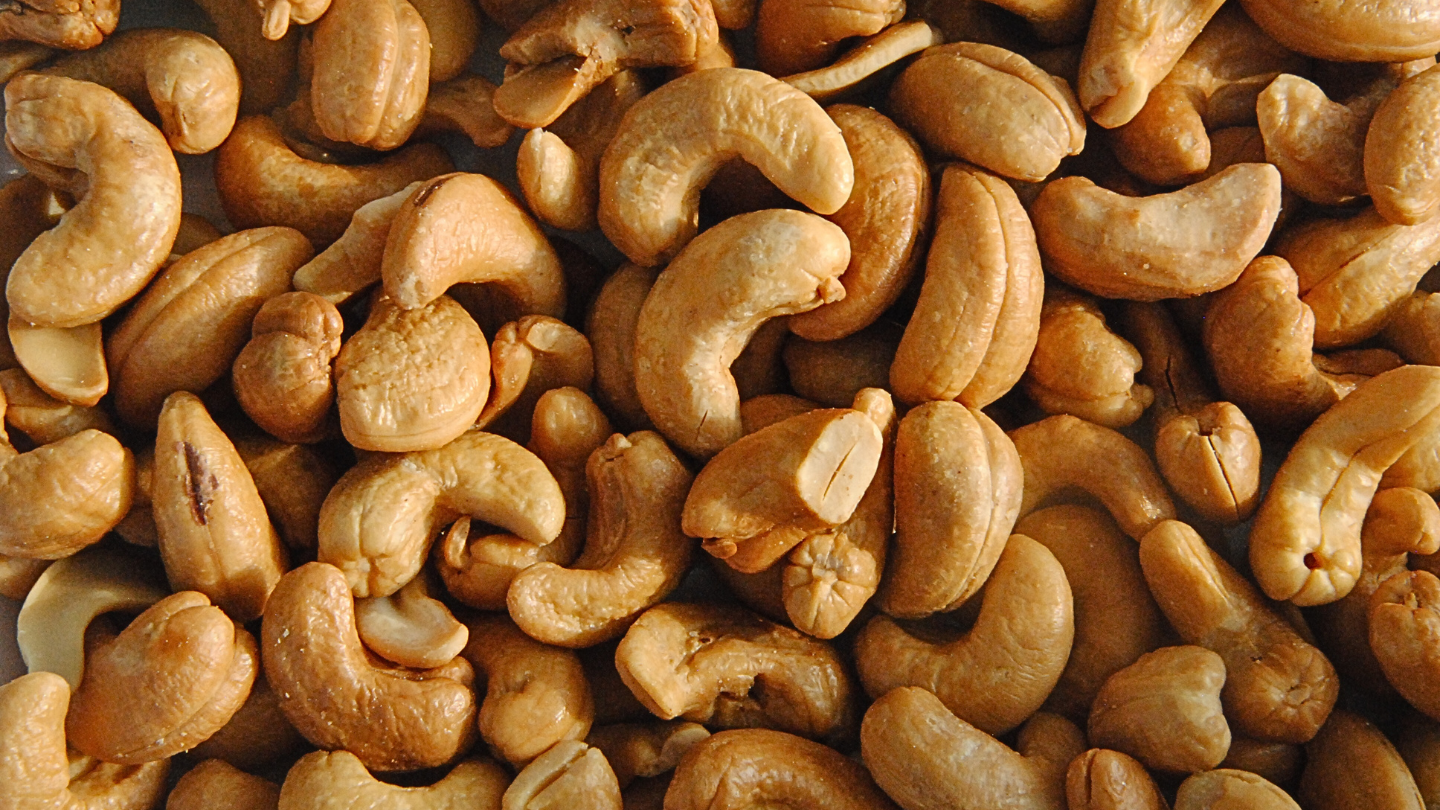Cashews are one of the most beloved nutritious nuts in the world. With their distinctive rich and creamy flavor and numerous health benefits, cashews have become an essential part of many people’s diets. However, not everyone knows how to select the right cashews for their needs. Join Le Duong Cashew as we explore cashews and popular varieties: white kernels, salted roasted, broken, split!
White cashew kernels
Characteristics
White cashew kernels are whole nuts that have been shelled but not heat-treated. This type retains its natural flavor, high freshness, and nutritional value. White cashew kernels have an ivory color, consistent size, and are undamaged.
Uses
- Cooking: White cashew kernels are often used in dishes such as stir-fries, roasts, steaming, and vegetarian dishes.
- Food ingredients: Used to make cashew milk, cashew cream, and various other dishes.
- Cosmetics: White cashew kernels are also used in the cosmetic industry to make cashew oil and skincare products.
Health benefits
- Rich in protein: Cashews are an abundant source of protein, which helps build and repair muscles.
- Beneficial fats: Contains monounsaturated fats, good for heart health and helping to reduce bad cholesterol.
- Minerals: Provides essential minerals like magnesium, iron, and zinc, supporting overall health.

White cashew kernels
 Salted roasted cashews
Salted roasted cashews
Characteristics
Salted roasted cashews are cashews that have been roasted and salted. The roasting process gives the cashews a distinctive aroma and crispy taste. Salted roasted cashews have a golden-brown color and a light salty flavor, creating an enjoyable eating experience.
Uses
- Snack: Salted roasted cashews are a great snack, easy to carry, and provide quick nutrition.
- Gifts: Often used as gifts during holidays, due to their delicious taste and meaningful significance.
- Cooking: Can be used to add to salads, stir-fries, or mixed dishes, enhancing the rich flavor.
Health benefits
- Energy boost: Salted roasted cashews provide quick energy for the body.
- Antioxidants: Contains many antioxidants, helping to prevent chronic diseases and protect cells from damage.

Salted roasted cashews
 Broken cashew nuts
Broken cashew nuts
Characteristics
Broken cashew nuts are cashews that have been broken during processing. Although they no longer have their original shape, broken cashews still retain their quality and nutritional value. Broken cashew nuts are small and irregular in size, suitable for various uses.
Uses
- Food processing: Widely used in food processing, baking, or as ingredients for dishes such as porridge, soups, and salads.
- Confectionery ingredients: An important ingredient in many types of confectionery, such as cashew candy and cashew cookies.
- Cooking ingredients: Can be used to make broth, sauces, or garnish dishes.
Health benefits
- Digestive support: Broken cashews contain fiber, which helps support the digestive system and prevent constipation.
- Immune system boost: Thanks to their high zinc content, broken cashews help boost the immune system and protect the body from infections.

Broken cashew nuts
 Broken cashews
Broken cashews
Characteristics
Broken cashews are also a type of broken nuts, but they are usually smaller and irregular in size. Broken cashews are often fragments or small pieces, but they still retain their flavor and quality.
Uses
- Food industry: Commonly used in the production of cashew butter, cashew milk, and other cashew products.
- Daily cooking: Used in daily dishes such as sticky rice, sweet soup, or added to stir-fries.
- Vegetarian dishes: Broken cashews are an important ingredient in many vegetarian dishes, from vegetarian cakes and soups to mixed dishes.
Health benefits
- Vitamin supplementation: Broken cashews contain many B vitamins, which help support the nervous system and improve mood.
- Weight loss: Containing healthy fats and protein, broken cashews can help you feel full longer, supporting weight loss.

Broken cashews
 Why is it necessary to classify cashews?
Why is it necessary to classify cashews?
Classifying cashews not only helps consumers choose products that meet their needs but also brings many benefits to both producers and sellers. Here are the specific reasons:
- Ensures product quality: Classifying cashews helps ensure that each type of product meets the best quality.
- Serves diverse consumer needs: Each type of cashew has different uses, so classification helps consumers easily find the right product.
- Optimizes processing and production: Helps make the processing and production process more efficient, reduces waste, and optimizes productivity.
- Enhances economic value: Classifying cashews helps enhance the economic value of the product.
- Facilitates management and storage: Makes it easier to manage and store the product.
Each type of cashew has unique characteristics and applications in cuisine. Understanding cashew classification will help you choose the right type of nut for your needs and usage. Cashews are not only a nutritious nut but also a source of inspiration for delicious and creative dishes.




